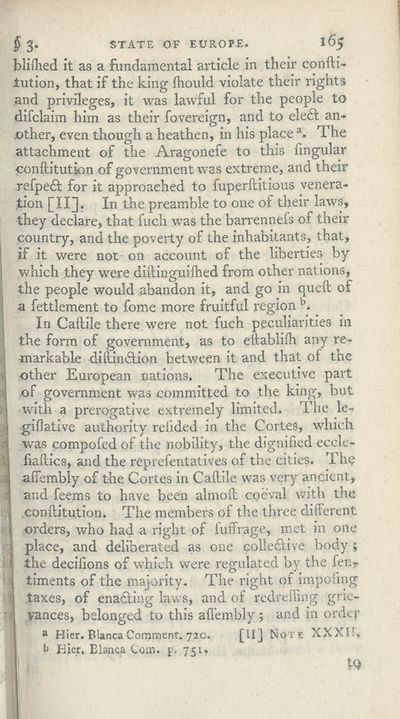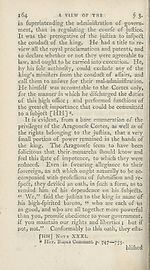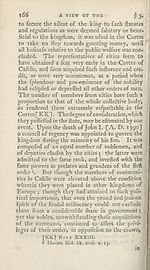Download files
Complete book:
Individual page:
Thumbnail gallery: Grid view | List view

§ 3* STATE OF EUROPE. 165
bliilied it as a fundamental article in their confti-
tution, that if the king fhould violate their rights
and privileges, it was lawful for the people to
difclaim him as their fovereign, and to eledf an¬
other, even though a heathen, in his place a. The
attachment of the Aragonefe to this lingular
conftitutjon of government was extreme, and their
refpeft for it approached to fuperftitious venera¬
tion [II]. In the preamble to one of their laws,
they declare, that fuch was the barrennefs of their
country, and the poverty of the inhabitants, that,
if it were not on account of the liberties by
which they were diftinguilhed from other nations,
the people would abandon it, and go in quell of
a fettlement to fome more fruitful region b.
In Cailile there were not fuch peculiarities in
the form of government, as to ellablilh any re-
ii markable diliimSlion between it and that of the
1 other European nations. The executive part
ji of government was committed to the king, but
i] with a prerogative extremely limited. The le-
g giflative authority relided in the Cortes, which
4 was compofed of the nobility, the dignified eccle-
h fiaftics, and the reprefentatives of the cities. The
a afiembly of tire Cortes in Callile was very ancient,
4 and feems to have been almoll cpeval with the
0 conllitution. The members of the three different
orders, who had a right of fuffrage, met in one
place, and deliberated as one colleftive body ;
the decilions of which were regulated by the fer.T
tj timents of the majority. The right of impoiing
J taxes, of enacting laws, and of redreffing grie-
, yances, belonged to this afl'embly ; and in order
a Hier. Blanca Comment. 720. [IIJ Note XXNII,
t> Hier. Blanca tom. p. 751.
bliilied it as a fundamental article in their confti-
tution, that if the king fhould violate their rights
and privileges, it was lawful for the people to
difclaim him as their fovereign, and to eledf an¬
other, even though a heathen, in his place a. The
attachment of the Aragonefe to this lingular
conftitutjon of government was extreme, and their
refpeft for it approached to fuperftitious venera¬
tion [II]. In the preamble to one of their laws,
they declare, that fuch was the barrennefs of their
country, and the poverty of the inhabitants, that,
if it were not on account of the liberties by
which they were diftinguilhed from other nations,
the people would abandon it, and go in quell of
a fettlement to fome more fruitful region b.
In Cailile there were not fuch peculiarities in
the form of government, as to ellablilh any re-
ii markable diliimSlion between it and that of the
1 other European nations. The executive part
ji of government was committed to the king, but
i] with a prerogative extremely limited. The le-
g giflative authority relided in the Cortes, which
4 was compofed of the nobility, the dignified eccle-
h fiaftics, and the reprefentatives of the cities. The
a afiembly of tire Cortes in Callile was very ancient,
4 and feems to have been almoll cpeval with the
0 conllitution. The members of the three different
orders, who had a right of fuffrage, met in one
place, and deliberated as one colleftive body ;
the decilions of which were regulated by the fer.T
tj timents of the majority. The right of impoiing
J taxes, of enacting laws, and of redreffing grie-
, yances, belonged to this afl'embly ; and in order
a Hier. Blanca Comment. 720. [IIJ Note XXNII,
t> Hier. Blanca tom. p. 751.
Set display mode to:
![]() Universal Viewer |
Universal Viewer | ![]() Mirador |
Large image | Transcription
Mirador |
Large image | Transcription
| Antiquarian books of Scotland > Kings & rulers > History of the reign of the Emperor Charles V. > Volume 1 > (183) |
|---|
| Permanent URL | https://digital.nls.uk/109184527 |
|---|
| Description | By William Robertson. London : Cadell and Davies, 1798. |
|---|---|
| Shelfmark | ABS.1.76.13 |
| Additional NLS resources: | |
| Description | Thousands of printed books from the Antiquarian Books of Scotland collection which dates from 1641 to the 1980s. The collection consists of 14,800 books which were published in Scotland or have a Scottish connection, e.g. through the author, printer or owner. Subjects covered include sport, education, diseases, adventure, occupations, Jacobites, politics and religion. Among the 29 languages represented are English, Gaelic, Italian, French, Russian and Swedish. |
|---|

